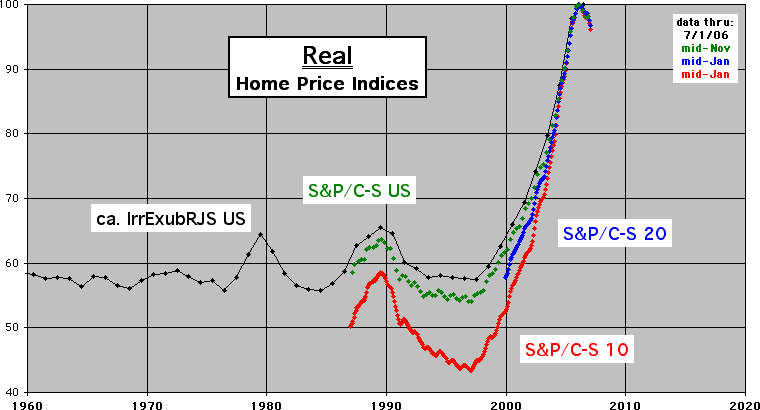 |
Move to Bonds and Cash
That is essentially the message in Jeremy Grantham's letter to portfolio managers today. The only assets that make sense to hold now are cash and sovereign debt. However, if you are a portfolio manager, career risk prevents you from following this advice to a tee.
All the World's a Bubble
Friday April 27, 2007 (TheStreet.com)
While euphoria sweeps stock markets here and worldwide, there are at least a few voices of dissent.
One, unsurprisingly, is legendary value investor Jeremy Grantham -- the man Dick Cheney, plus a lot of other rich people, trusts with his money. Grantham, chairman of Boston firm Grantham Mayo Van Otterloo, has been a voice of caution for years. But he has upped his concerns in his latest letter to shareholders. Grantham says we are now seeing the first worldwide bubble in history covering all asset classes.
Everything is in bubble territory, he says.
Everything.
The bursting of this bubble will be across all countries and all assets.' -- Jeremy Grantham
AntiSpin: We got hold of the full letter and it's distinctly iTulipy. He talks about bubbles, such as in private equity, how hedge funds overcharge for managing mundane asset classes (see Most Hedge Funds Suck), and so on, and what will happen when they inevitably turn turtle. The letter is discussed in the iTulip Select forums in the context of Too Many Dollar Bears?Friday April 27, 2007 (TheStreet.com)
While euphoria sweeps stock markets here and worldwide, there are at least a few voices of dissent.
One, unsurprisingly, is legendary value investor Jeremy Grantham -- the man Dick Cheney, plus a lot of other rich people, trusts with his money. Grantham, chairman of Boston firm Grantham Mayo Van Otterloo, has been a voice of caution for years. But he has upped his concerns in his latest letter to shareholders. Grantham says we are now seeing the first worldwide bubble in history covering all asset classes.
Everything is in bubble territory, he says.
Everything.
The bursting of this bubble will be across all countries and all assets.' -- Jeremy Grantham
We also received an update from our intrepid Real DOW analyst who gives us his take on US home prices. And it ain't pretty.

S&P/C-S 10 is the S&P Case-Shiller (C-S) home price index for 10 largest cities, released monthly, plotted on a real (inflation-adjusted) basis. The last datum was released 4/24 for the February 2007 number–actually a 3 month moving average, thus representing a Dec 2006 to Feb 2007 average. To get the real number, the C-S index is divided by the average CPI-U for the same three month period. The data are then scaled to a max. of 100.
S&P/C-S 20 is the same analysis applied to the 20 largest cities, and S&P/C-S US to home prices nationally and based on quarterly data.
IrrExubRJS US is based on Shiller’s real annual data, except for 2006 which is an estimation and explained here.
Meanwhile...
US posts weakest growth in four years
April 27, 2007
US economic growth during the first quarter was the weakest in four years, hurt by a slumping housing market and deteriorating international trade, the Commerce Department reported.
At the same time, one price gauge in the GDP report posted its biggest jump in 16 years, sending a jolt of fear through financial markets that official interest rates will stay high.
So far, our now five year old prediction of the bubble cycle economy ending in an inflationary recession appears to be playing out, except more rapidly than expected. The housing bubble decline driven recession, scheduled for Q4 2007, is arriving ahead of schedule, as is the inflation, which is supposed to wait until the dollar depreciates further. If our Real DOW friend's analysis is correct, we are in very early innings of the process. Given where we're starting from, maybe we're in for the Wile E. Cayote scenario: after you strap on the skies with the rocket pack on your back and you fly off the cliff past the Road Runner, you fall 1,000 feet to the ground, then the anvil falls on you, then the rocket hits the cliff and the cliff falls on you.April 27, 2007
US economic growth during the first quarter was the weakest in four years, hurt by a slumping housing market and deteriorating international trade, the Commerce Department reported.
At the same time, one price gauge in the GDP report posted its biggest jump in 16 years, sending a jolt of fear through financial markets that official interest rates will stay high.
Grantham letter is analyzed for iTulip Select subscribers here.
Comment